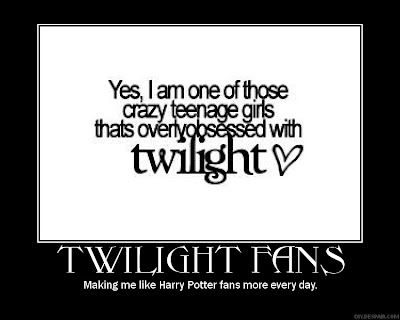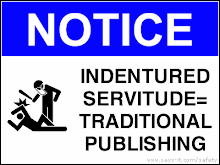Status: Writing on Chapter 146 of Starchild Duel. (Page 1,321)
Doing: Writing on this blog; answering e-mails; working out, and well...you know the rest! :0) Watching: Nothing. Usually during the day hours--up till 5PM; the TV stays off.Listening to: Nothing at the moment. Have a bit of a crushing migraine at the moment. (Weather changes yet again--forcing yet another sinus cold onto me.)Reading: Kushiel's Scion. Page 252. Star Trek: Crucible: McCoy:-Provenance of Shadows. Page 11.TOPIC: WHY DO SOME PUBLISHED AUTHORS TREAT THEIR FANS LIKE SHIT?I know I'm going to get snarked on this one. I mean nobody should go and upset the Miss High and Mighty J.K. Rowling.But a recent article in the New York Times had me pissed! So I had to stick up for book fans everywhere. If anyone here is concerned about copyright issues and the like--you can go and kiss my red and white butt.This isn't about author rights and such, but how most fans these days have been treated like crap and garbage for so long--underfoot--by their uncaring authors.Fans should be treated with respect and like a precious commodity. This article I read just proves that fans are run ripshod over the very people they look up to.And the question is why? Why are some authors real bitches and assholes about how their work should be perceived and coddled? If they didn't want their fans to get this heavily involved in their work--impassioned would be more like it--then maybe they shouldn't have wrote it!??Heavens to Mergatroid! Sheesh!***The thing about this article is that it reveals
a lot of things about the state of mind of an overtly successful author whom pigeon-holed herself into just writing one series based on one concept--and never branched out to distinguish herself into a well-rounded writer over the years.
That's the one thing that has doomed Rowling forever and ever.
But she sits there and complains that someone is taking something from her that's already been a universally recognized and established cult icon.
It's not even
close to being true.
Vander Ark's lexicon is nothing more than a dictionary-compendium filled with terms and definitions written about the HP universe--along with some of the book's passages and examples.
A fan's most exalted version of a fantasy guide come to life. And Ark is a die-hard fan. And he did it because he truly loved her work.
Not because he wanted to insult her intelligence.
The only reason why Rowling is trying to stop the lexicon from being published is because she had intended to publish a similar book--but Vander Ark torpedoed that idea out of the water--years earlier than she was expecting.
But also for control of the idea and the notion that she alone has absolute rights to the HP theme--and no one else. (Reason why she's suing RDR Books for copyright infringement.)
Which is why Vander Ark felt betrayed by her in this whole affair.
She's not doing this because she feels "angry" or "outraged", but because HP was a major cash cow for Rowling (to the tune of billions), and she doesn't want to see a penny of that being challenged by some then unknown fan on the internet.
So
money is the sole reason for this suit. But it's a bit hypocritical for someone whom is sitting on $300M dollars in assets--isn't going to hungry any time soon--to complain about some poor fan's
intent to publish an entertainment lexicon that charges only $24.
But what she wants from Vander Ark is "control". She's okay for the book to be published--but so long as it doesn't take away work that's been
already in print for the last decade.
It would be a completely differently story if the man took the HP theme and characters and copy-cat her work on an entirely different level--but he didn't.
The article clearly is trying to make it so that Rowling is the victim here. When in fact, she went and
endorsed the site from the get go, admitted freely that she often perused the site to keep her own facts in the books'--straight--and said
nothing about keeping the site information from
ever seeing print.
Not once.
And the idea that people won't
read anymore HP books if the lexicon ever goes out to print is utter foolishness. How many here have read HP more than once? How many of you have read spin-offs, compendiums, and whatnot--on HP alone? Did it stop you from going back to reading the originals?
I don't think so.
That's like saying: "There's hundreds of STAR TREK books out there, I guess I don't need to watch any of the series, now do I? I got all the information I need right here."
Screw that! I'm still watching them! lol
The argument is lame to the extreme. In their minds, it's all about money-making schemes and everyone else--not counting the
millions Rowling's raked in in toy endorsements and food-related contracts with major companies here in the States and over in Great Britain.
The lexicon won't take anything away from what's already out there.
What I got from this was some amusement as well: Ms. Rowling being so distraught over the
idea that someone was going to publish this lexicon--it gave her writer's block.
On
what? A book that can't possibly surpass the overpowering success of HP? This is what I meant by being "pigeon-holed" earlier. If you only write one thing and one thing
only, you're not going to be able to branch out to other genre--let alone other books.
Because people will link you to whatever success you had before and they won't accept anything less than that.
That's why I branched out to as many genres as I possibly could. If any one of my books were to make it, I wouldn't be confined to just
one book series. I have many to choose from.
Rowling no longer had that luxury. In the 10 years since the first book came out, not one other book came out to compliment HP as a companion book.
And the idea that if Rowling loses this suit, the "floodgates will open" and writers everywhere will "lose control over their material".
Pardon my frankness, but that's literal
bullshit.
One? Fan-fiction on HP has been written for the better part of the decade. The moment the book went into extreme-success mode, all bets were off on fans, readers, and writers to not capitalize on the sensation which Harry Potter was generating.
How many spin-offs of HP have their been in the 10 years hence? I lost count.
Two? Since when did Rowling ever give a
damn about writers everywhere? Ever since this saga of hers went gangbusters, this woman has been on a vanity trip that would make the 60s love and peace movement look like a cakewalk.
She's been so high on herself, salivating on her on self-importance, that she hasn't
cared one whit about the rights of other writers--up until now.
This is all about herself. This is all about
her. This act of hers--in this instance--is more of an
insult than a nod to us writers everywhere. She's trying to cry victim over an act that is widely as being more asinine than having any real substance or value.
At some point in her life, she's going to have to realize that she has next to
zero control over what happens with the Harry Potter books. People are going to continue to prosper off of her work--for good or not.
Three? Unpublished writers like myself have had our works on the net for the better part of the last decade. I'm working on 6 years myself.
So why would the publishing or writing world care about what I put on the net?
I'M UNPUBLISHED. I'M A NOBODY! Hel~lo people! No one's going to care! (lmao)
And thus far, I haven't lost control over my work. My books are so massive and complex, who the heck is going to spend hours over hours on end--trying to take something that their collective 5th-6th grade education and comprehension skills can't
possibly grasp--let alone understand well enough to duplicate and then try to
publish on their own accord?
Personally? I'd give out the Freedom Medal if someone were out rightly successful in their endeavor 10 or 20 years down the road. I'd like to shake their hand personally and congratulate them on the one thing which I've been failing at for the last 8 years!
("Hey, buddy? What's you're secret?")
But...? That's not going to happen.
So I'm not worried. Because--again?--no one
cares who I am or what my books are about.
And my wife--whom is an avid fan of HP herself (I'm not)--put everything in contrast to this court-room drama by saying this the other night: "Someone should shut the bitch up with a doughnut.“
Sky

